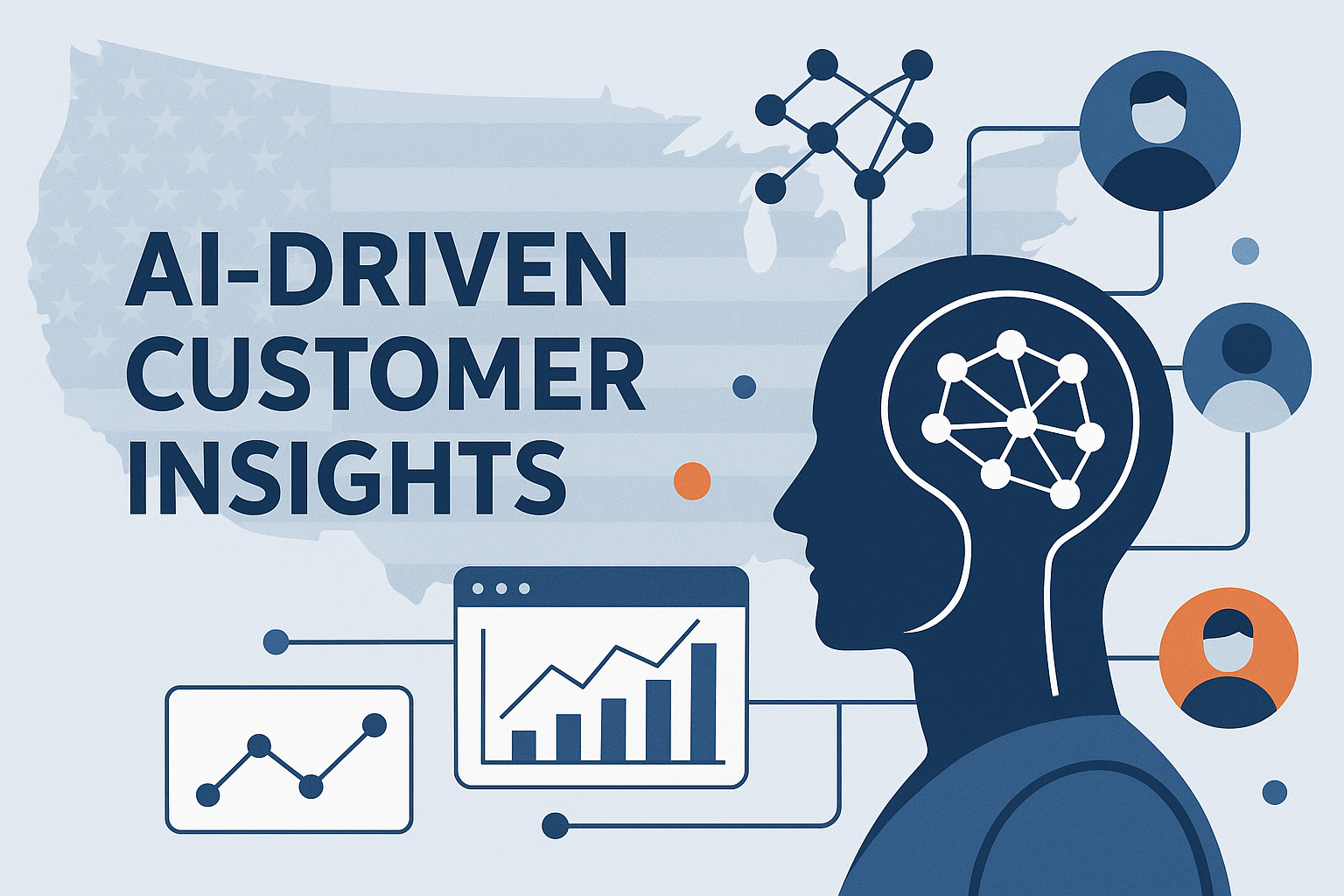
AI-Driven Customer Insights: Unlocking Business Growth in 2025
Understanding AI-Driven Customer Insights for U.S. Businesses
In 2025, AI-driven customer insights have become a game-changer for U.S. companies seeking to understand, engage, and retain their customers. By leveraging artificial intelligence, businesses can analyze massive volumes of data, uncover hidden patterns, and predict customer behavior with unprecedented accuracy. This comprehensive guide explores how AI-driven customer insights are transforming industries, the top tools available, and best practices for implementation.
What Are AI-Driven Customer Insights?
AI-driven customer insights refer to actionable information about customer preferences, behaviors, and needs, extracted using artificial intelligence technologies such as machine learning, natural language processing, and predictive analytics. These insights empower organizations to:
- Personalize marketing campaigns 📦
- Improve product development 🏗️
- Enhance customer service 🏥
- Boost customer retention and loyalty ✅
TIP: AI-driven customer insights go beyond traditional analytics by identifying trends and opportunities that human analysts might miss.
Why AI-Driven Customer Insights Matter in 2025
The U.S. Market Landscape
With over 90% of U.S. consumers expecting personalized experiences in 2025, businesses that fail to leverage AI-driven insights risk falling behind. AI enables companies to:
- Analyze real-time customer data from multiple channels
- Predict future purchasing behavior
- Identify at-risk customers before they churn
- Optimize pricing and promotions
Key Benefits
- Speed: Instantly process and analyze vast datasets
- Accuracy: Reduce human error and bias
- Scalability: Handle millions of customer interactions simultaneously
- Proactivity: Anticipate customer needs before they arise
Top 10 AI-Driven Customer Insights Tools for U.S. Businesses in 2025
Choosing the right tool is crucial for maximizing the value of AI-driven customer insights. Here are the top 10 platforms leading the U.S. market this year:
- Salesforce Einstein
- Adobe Sensei
- IBM Watson Customer Insights
- Microsoft Dynamics 365 AI
- Google Cloud AI Platform
- Oracle CX Cloud
- SAP Customer Data Cloud
- Zoho Analytics AI
- SAS Customer Intelligence 360
- HubSpot AI Insights
Side-by-Side Comparison Table
| Rank | Tool Name | Best For | Key AI Features | U.S. Market Focus | Pricing Tier |
|---|---|---|---|---|---|
| 1 | Salesforce Einstein | CRM & Sales | Predictive analytics, NLP | Enterprise | $$$$ |
| 2 | Adobe Sensei | Marketing & Personalization | Image & text analysis, automation | Enterprise | $$$$ |
| 3 | IBM Watson Customer Insights | Data Integration | Deep learning, segmentation | Enterprise | $$$$ |
| 4 | Microsoft Dynamics 365 AI | Sales & Service | Predictive scoring, chatbots | Enterprise/SMB | $$$ |
| 5 | Google Cloud AI Platform | Custom AI Models | ML, NLP, AutoML | All sizes | $$-$$$$ |
| 6 | Oracle CX Cloud | Omnichannel Engagement | AI-driven recommendations | Enterprise | $$$$ |
| 7 | SAP Customer Data Cloud | Data Unification | Identity resolution, analytics | Enterprise | $$$$ |
| 8 | Zoho Analytics AI | SMB Analytics | AI-powered reports, forecasting | SMB | $$ |
| 9 | SAS Customer Intelligence 360 | Advanced Analytics | Predictive modeling, segmentation | Enterprise | $$$$ |
| 10 | HubSpot AI Insights | Inbound Marketing | Lead scoring, content suggestions | SMB | $$ |
TIP: When selecting a tool, consider your business size, integration needs, and the specific AI features that align with your goals.
How AI-Driven Customer Insights Work: A Technical Overview
Data Collection
AI systems gather data from diverse sources, including:
- Website and app interactions
- Social media activity
- Purchase history
- Customer support tickets
- Surveys and feedback forms
Data Processing and Analysis
AI algorithms process raw data using techniques like:
# Example: Customer segmentation using K-Means clustering
from sklearn.cluster import KMeans
# Assume 'customer_data' is a DataFrame with relevant features
kmeans = KMeans(n_clusters=5, random_state=0).fit(customer_data)
customer_data['segment'] = kmeans.labels_
Insight Generation
The AI system identifies patterns, predicts behaviors, and generates actionable insights, such as:
- Which customers are likely to churn
- What products a segment is most interested in
- Optimal times to engage with specific customers
Action and Automation
Insights are integrated into business processes, enabling:
- Automated personalized email campaigns
- Dynamic website content adjustments
- Real-time customer support routing
Real-World Applications of AI-Driven Customer Insights in the U.S.
1. Retail
- Personalized product recommendations
- Dynamic pricing strategies
2. Financial Services
- Fraud detection and prevention
- Customer lifetime value prediction
3. Healthcare
- Patient engagement optimization
- Predictive appointment scheduling
4. Travel & Hospitality
- Tailored offers and loyalty programs
- Sentiment analysis from reviews
5. E-commerce
- Abandoned cart recovery
- AI-powered chatbots for support
TIP: Start with a pilot project in one department to demonstrate ROI before scaling AI-driven customer insights across your organization.
Best Practices for Implementing AI-Driven Customer Insights
1. Define Clear Objectives
Set measurable goals, such as increasing customer retention by 10% or boosting upsell rates.
2. Ensure Data Quality
Clean, accurate, and unified data is essential for reliable AI insights.
3. Prioritize Customer Privacy
Comply with U.S. data privacy regulations and be transparent with customers about data usage.
4. Foster Cross-Department Collaboration
Involve marketing, sales, IT, and customer service teams for holistic implementation.
5. Continuously Monitor and Optimize
Regularly review AI models and outcomes to ensure ongoing accuracy and relevance.
Conclusion
AI-driven customer insights are revolutionizing the way U.S. businesses understand and engage with their customers in 2025. By harnessing the power of artificial intelligence, organizations can unlock deep, actionable insights from vast datasets, enabling personalized experiences, improved retention, and higher revenue. The top tools on the market offer a range of features tailored to different business needs, from enterprise giants to agile SMBs. Successful implementation requires clear objectives, high-quality data, a focus on privacy, and ongoing optimization. As customer expectations continue to rise, embracing AI-driven customer insights is no longer optional—it’s essential for sustained business growth and competitive advantage in the modern U.S. marketplace.